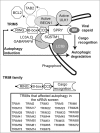TRIM proteins regulate autophagy: TRIM5 is a selective autophagy receptor mediating HIV-1 restriction - PubMed (original) (raw)
Comment
TRIM proteins regulate autophagy: TRIM5 is a selective autophagy receptor mediating HIV-1 restriction
Michael A Mandell et al. Autophagy. 2014.
Abstract
The tripartite motif protein family (TRIM) constitutes a class of immune-regulated proteins with antiviral, immune, cancer, and other properties reminiscent of those ascribed to autophagy. We show that TRIMs have dual roles in autophagy: as regulators and as cargo receptors. As regulators, TRIMs nucleate the core autophagy machinery by acting as platforms that assemble ULK1 and BECN1 into a functional complex in preparation for autophagy. TRIMs also act as novel selective autophagy receptors as exemplified by TRIM5/TRIM5α, a known HIV-1 restriction factor with a hitherto poorly defined mode of action. TRIM5 recognizes and targets HIV-1 for autophagic destruction. TRIM5 interactions with mammalian Atg8 proteins are required for this effector function. This establishes TRIM family members as regulators of autophagy, explains the antiretroviral mechanism of TRIM5, and defines a new basis for selective autophagy.
Keywords: HIV-1 restriction; TRIM5; selective autophagy.
Figures
Figure 1.
Top, TRIM5 promotes autophagy by acting as a platform for the assembly of active ULK1 and BECN1 complexes and rhesus (but not human) TRIM5 delivers incoming HIV-1 capsids for autophagic degradation by directly binding both the viral capsid and mammalian Atg8s. Assembly of ULK1, BECN1, and mammalian Atg8s is a conserved feature in most TRIMs. We propose that TRIMs use their SPRY or other cargo recognition domains for the autophagic targeting of a wide variety of microbial and endogenous cellular substrates. Shown is a generic TRIM domain organization; the table lists TRIMs that affect autophagy in our siRNA screen.
Comment on
- TRIM proteins regulate autophagy and can target autophagic substrates by direct recognition.
Mandell MA, Jain A, Arko-Mensah J, Chauhan S, Kimura T, Dinkins C, Silvestri G, Münch J, Kirchhoff F, Simonsen A, Wei Y, Levine B, Johansen T, Deretic V. Mandell MA, et al. Dev Cell. 2014 Aug 25;30(4):394-409. doi: 10.1016/j.devcel.2014.06.013. Epub 2014 Aug 7. Dev Cell. 2014. PMID: 25127057 Free PMC article.
Similar articles
- TRIM proteins regulate autophagy and can target autophagic substrates by direct recognition.
Mandell MA, Jain A, Arko-Mensah J, Chauhan S, Kimura T, Dinkins C, Silvestri G, Münch J, Kirchhoff F, Simonsen A, Wei Y, Levine B, Johansen T, Deretic V. Mandell MA, et al. Dev Cell. 2014 Aug 25;30(4):394-409. doi: 10.1016/j.devcel.2014.06.013. Epub 2014 Aug 7. Dev Cell. 2014. PMID: 25127057 Free PMC article. - Precision autophagy directed by receptor regulators - emerging examples within the TRIM family.
Kimura T, Mandell M, Deretic V. Kimura T, et al. J Cell Sci. 2016 Mar 1;129(5):881-91. doi: 10.1242/jcs.163758. Epub 2016 Feb 15. J Cell Sci. 2016. PMID: 26906420 Free PMC article. Review. - TRIM-directed selective autophagy regulates immune activation.
Kimura T, Jain A, Choi SW, Mandell MA, Johansen T, Deretic V. Kimura T, et al. Autophagy. 2017 May 4;13(5):989-990. doi: 10.1080/15548627.2016.1154254. Autophagy. 2017. PMID: 26983397 Free PMC article. Review. - Interactomic analysis reveals a homeostatic role for the HIV restriction factor TRIM5α in mitophagy.
Saha B, Salemi M, Williams GL, Oh S, Paffett ML, Phinney B, Mandell MA. Saha B, et al. Cell Rep. 2022 May 10;39(6):110797. doi: 10.1016/j.celrep.2022.110797. Cell Rep. 2022. PMID: 35545034 Free PMC article. - A non-canonical role for the autophagy machinery in anti-retroviral signaling mediated by TRIM5α.
Saha B, Chisholm D, Kell AM, Mandell MA. Saha B, et al. PLoS Pathog. 2020 Oct 14;16(10):e1009017. doi: 10.1371/journal.ppat.1009017. eCollection 2020 Oct. PLoS Pathog. 2020. PMID: 33052966 Free PMC article.
Cited by
- Myospryn deficiency leads to impaired cardiac structure and function and schizophrenia-associated symptoms.
Tsoupri E, Kostavasili I, Kloukina I, Tsikitis M, Miliou D, Vasilaki E, Varela A, Nakos-Bimpos M, Davos C, Mavroidis M, Polissidis A, Capetanaki Y. Tsoupri E, et al. Cell Tissue Res. 2021 Sep;385(3):675-696. doi: 10.1007/s00441-021-03447-2. Epub 2021 May 26. Cell Tissue Res. 2021. PMID: 34037836 - TRIM5α: A Protean Architect of Viral Recognition and Innate Immunity.
Spada SJ, Grigg ME, Bouamr F, Best SM, Zhang P. Spada SJ, et al. Viruses. 2024 Jun 21;16(7):997. doi: 10.3390/v16070997. Viruses. 2024. PMID: 39066160 Free PMC article. Review. - TRIM29 overexpression is associated with poor prognosis and promotes tumor progression by activating Wnt/β-catenin pathway in cervical cancer.
Xu R, Hu J, Zhang T, Jiang C, Wang HY. Xu R, et al. Oncotarget. 2016 May 10;7(19):28579-91. doi: 10.18632/oncotarget.8686. Oncotarget. 2016. PMID: 27081037 Free PMC article. - Autophagy in leukocytes and other cells: mechanisms, subsystem organization, selectivity, and links to innate immunity.
Deretic V. Deretic V. J Leukoc Biol. 2016 Nov;100(5):969-978. doi: 10.1189/jlb.4MR0216-079R. Epub 2016 Aug 4. J Leukoc Biol. 2016. PMID: 27493243 Free PMC article. Review. - TRIM5α Restricts Flavivirus Replication by Targeting the Viral Protease for Proteasomal Degradation.
Chiramel AI, Meyerson NR, McNally KL, Broeckel RM, Montoya VR, Méndez-Solís O, Robertson SJ, Sturdevant GL, Lubick KJ, Nair V, Youseff BH, Ireland RM, Bosio CM, Kim K, Luban J, Hirsch VM, Taylor RT, Bouamr F, Sawyer SL, Best SM. Chiramel AI, et al. Cell Rep. 2019 Jun 11;27(11):3269-3283.e6. doi: 10.1016/j.celrep.2019.05.040. Cell Rep. 2019. PMID: 31189110 Free PMC article.
Publication types
MeSH terms
Substances
LinkOut - more resources
Full Text Sources
Other Literature Sources
Research Materials
